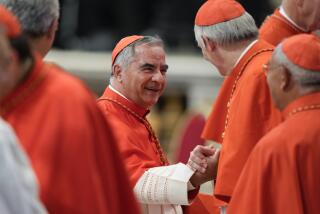Olivetti Chairman Vows to Fight Fraud Conviction : * Banking: Carlo De Benedetti faces six years in prison in connection with the collapse of Italy’s largest private bank.
- Share via
MILAN, Italy — Carlo De Benedetti insisted Friday that he did not make any money from the collapse of Italy’s largest private bank and said he will appeal his conviction as an accessory to fraudulent bankruptcy.
The chairman of computer maker Olivetti was convicted Thursday and sentenced to six years and four months in prison on charges that stemmed from his 65-day term as deputy chairman of Banco Ambrosiano.
The 1982 collapse of the bank provoked Italy’s biggest postwar banking scandal. De Benedetti was one of 33 people convicted in the case.
De Benedetti had invested about $42 million for a 2% stake in the bank before he was appointed deputy chairman.
Judges ruled that De Benedetti made an illicit profit of $22.4 million when he sold his stake in the bank in January, 1982.
“My companies didn’t earn one lira, and the bank didn’t lose one lira thanks to me,” De Benedetti said Friday.
The financier said he will appeal the court decision if necessary. Under Italian law the sentence is suspended until the full appeal process, which could take years, is completed.
“I haven’t lost my serenity because of my absolute conviction that I always acted with correctness, transparency and determination,” De Benedetti told a news conference.
“I’m certain that the facts will prevail and that justice will be done,” he added.
De Benedetti’s conviction centered on the bank shares he bought shortly before he was appointed deputy chairman. He sold the shares after resigning from the post he held for 65 days, citing disagreements with the bank’s secretive chairman, Roberto Calvi.
Calvi was found hanging from a London bridge in June, 1982, a few months before his bank collapsed in the wake of defaults on $1.3 billion in loans made by Banco Ambrosiano to several dummy companies in Latin America.
Those loans were granted after letters of credit were supplied by the Vatican Bank. Calvi was known as “God’s banker” for his close ties with the Vatican.
The Vatican bank, officially known as the Institute for Religious Works, was the largest shareholder in Banco Ambrosiano.
Prosecutors were unable to pursue the case against Vatican Bank employees after Italian courts ruled in 1988 that a treaty between Italy and the Vatican prevented the prosecution of three Vatican Bank officials, including U.S. Archbishop Paul Marcinkus.
All 33 of the defendants convicted Thursday were found guilty of being accessories to fraudulent bankruptcy, said prosecutor Luigi Dell’Osso.
More to Read
Sign up for Essential California
The most important California stories and recommendations in your inbox every morning.
You may occasionally receive promotional content from the Los Angeles Times.













